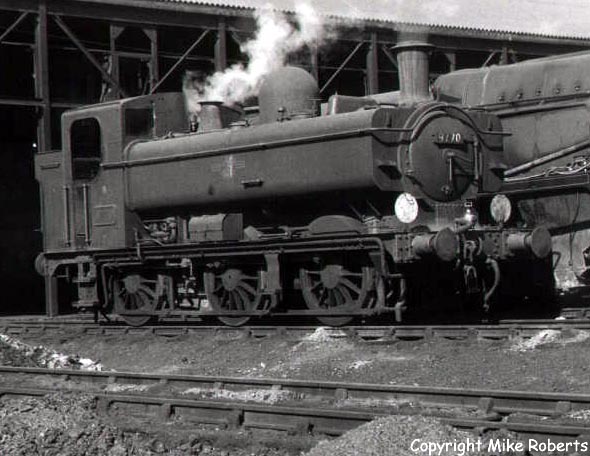
Southern Enginemen - WESTERN INCURSION Western Class 57XX 0-6-0PT at Nine Elms. (Photo copyright Mike Roberts)
When more of the class eventually arrived I can't say that they endeared themselves to the great majority of the 70A footplate fraternity. They were most uncomfortable and particularly awkward in every aspect. Certainly they were strong, for they would lift twelve or thirteen coaches with relative ease on the stock working between Waterloo and Clapham Yard, however their final departure was not lamented. Their arrival actually created quite a few brake related incidents due to the twenty-five inches of vacuum that the Western Region used. Some trains departing from Waterloo suffered dragging brakes caused by the fact that the empty stock brought into the terminal had created more that the prescribed twenty-one inches of vacuum. As a consequence the train engine could not fully release the brakes due to the in-balance between the vacuum established in the rolling stock reservoirs being greater than that possible of being created in the brake pipe. I remember personally 'suffering' the rigours involved in this situation when called upon to fire to 'Top Link' Driver, Sam Mills, on 66 Duty, the 5.39 pm to Salisbury one cold January evening in 1959. As soon as we departed from Waterloo with our train of eleven coaches the trouble began immediately the banking engine 'dropped off' the rear of the train at the top of the platform. Despite the fact that the locomotive, a Standard Class '5', No. 73111, "King Uther", was driven extremely hard we barely attained forty miles-per-hour at Clapham Junction. Thus was the tardy progress that we made all the way down to Woking, where we eventually arrived rather late and a bit the worse for wear. Sam was immediately on the phone to the signalman and then organised the 'strings' to be pulled to destroy the excessive reservoir vacuum throughout the train. In the meantime I toiled to restore the fire, water level and boiler pressure for our continued journey. On restarting the train from Woking what a difference, as we freely accelerated through the cutting at St Johns, climbing the bank on towards Pirbright Junction and Farnborough, our next stop en route. I believe the delay to the service that day perhaps highlighted the problem surrounding the introduction of these locomotives and changes were implemented that improved the general situation. Once the problem had been identified the release 'strings' were regularly pulled on the empty stock whilst it stood in Waterloo. In addition the vacuum limit valves and pumps on the locomotives received closer attention in the shed. The WR Pannier Tank engines were in their turn replaced some years later by the BR Standard Class '3' 2-6-2T engines, and I recall bringing one of them 'light engine' up to Nine Elms from Salisbury one night. Many of these locomotives had similarly become redundant from other depots and in general terms were a far more acceptable replacement locomotive. About the same time a Class 'H', 0-4-4T, No. 31326 was seen on shed for a trial period, however I never had the opportunity of actually working on the locomotive although I had travelled behind members of the same class on many occasions on various branch lines in the South East. Below is a record of the WR Pannier Tank engines I worked on during their 'sojourn' at 70A. Class 57XX 0-6-0PT (built 1933) 9770 (previously 83D Laira Plymouth)
30/01/1960 27/02/1960 22/03/1960 23/03/1960 24/03/1960 25/03/1960 25/09/1960 08/08/1961 16/04/1962 05/01/1963 19/06/1963 20/06/1963
09/03/1962 16/03/1962
03/01/1962
14/02/1960 27/02/1960 10/05/1962
01/04/1960 13/08/1960 19/11/1961
06/02/1962 27/04/1962 10/05/1963 25/08/1963
Brian Aynsley has written: The item by Jim Lester about the Western pannier tanks brought back painful memories for me. When I was based at Guildford, I went up to Clapham Junction one evening to relieve on a Nine Elms duty. I was told that the engine was in platform 2, on the 'Kenny side', so I went there and found a Western pannier tank. There was nobody on the footplate so I climbed aboard and crossed to the fireman's side to put my kit away. Unfortunately, I was not aware of the 'well' in the centre of the cab which was about four inches lower than the rest of the floor. As I stepped into the well, I tripped and nearly fell out of the other side of the cab. I sustained a painful shin injury which took day to heal up. I was always careful on the panniers after that. Another import to Nine Elms, later than the panniers, probably in 1965 or 1966, were the Midland 2-6-2 tanks, numbered 41000 etc. One afternoon I was working the Royal Wessex empties to Waterloo with one of these engines and nearly had a mishap. The vacuum brake valve operated from side to side, rather than up and down as on most engines. As the train rolled into platform 11, I realised that we were not slowing down as expected. A full brake application was required before we came to a shuddering halt just before we hit the buffers. Phew! what a relief. The station shift manager was sitting in the concrete hut which was above the buffers, he left the hut in a very undignified manner and left me in some doubt about my parentage.
|
|
Site sponsored/maintained by SVSFilm © 2010 ... Go to SVS Film Index Go to Nine Elms Main Index - "Light to Loco" |